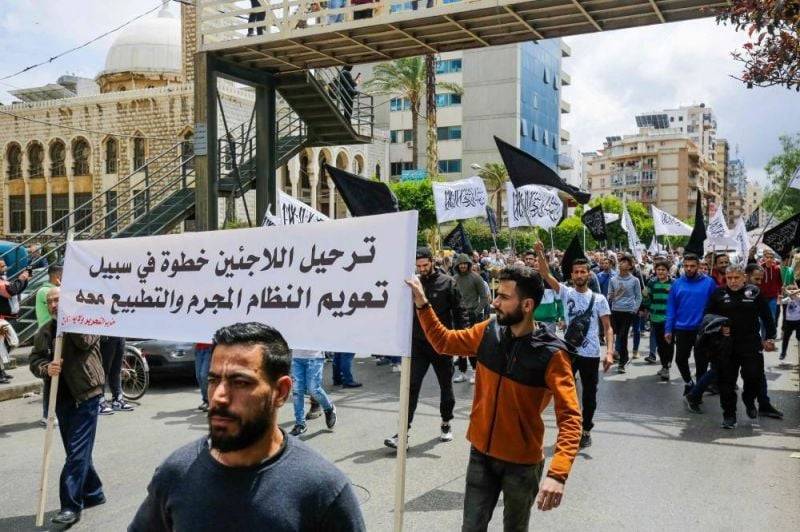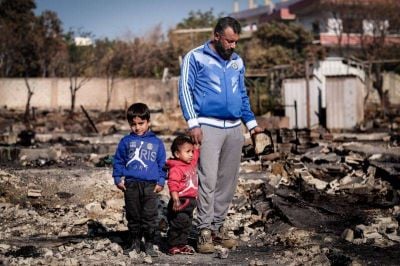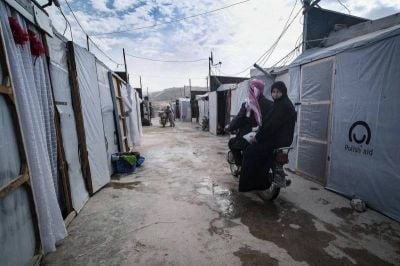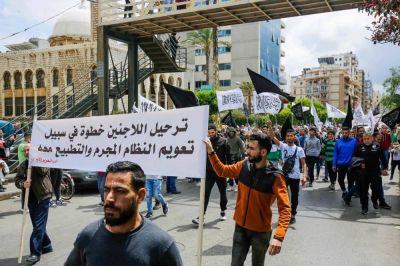
Protesters demonstrate against the repatriation of Syrian refugees, in Tripoli, North Lebanon, April 28, 2023. (Credit: Ibrahim Chalhoub/AFP)
BEIRUT — Caretaker Social Affairs Minister Hector Hajjar warned Sunday of "a big explosion between Lebanese and displaced Syrians in Lebanon" if authorities do not reduce "tensions" over the issue, amid rising anti-Syrian sentiments in the political arena and among the Lebanese population.
The tensions also come as officials to step up restrictive measures against refugees, including deportations back to Syria.
"If we don't find a solution to reduce tensions over the repatriation of displaced Syrians, there is a risk of a big explosion between the Lebanese and the displaced Syrians in Lebanon," Hajjar warned in an interview with local channel LBC Sunday night.
He also pointed to an "unusual timing of intentional intensification [of tensions] between the displaced people and the Lebanese, carried out by some parties," which he did not name.
"There is an agreement either to relieve the whole region or for the situation to explode. This may be related to bringing the issue of displaced Syrian people back to the table because Lebanon is the only remaining point of confrontation in the region," said the minister, who expressed concern that a recent Iranian-Saudi rapprochement "has been reached at Lebanon's expense."
Hajjar's remarks come despite the fact that many observers believe that the restoration of diplomatic ties between Riyadh and Tehran, as well as regional diplomatic efforts to bring Damascus back into the Arab fold, could have a positive impact on Lebanon.
But according to other observers, Lebanon has not been on the agenda of the Iranian-Saudi talks.
Coordination with the Syrian state
Referring to a series of restrictive measures taken by the Lebanese government on April 26, Hajjar said the country needed to address "the unregulated dispersion of Syrian displaced persons." Among those measures was a request that the UN's refugee agency provide certain data on Syrian refugees in Lebanon.
"The United Nations High Commissioner for Refugees (UNHCR) has data on refugees from before 2015. Those that cover the post-2015 period must be fully delivered to the state," he stressed, adding that "the state had already received incomplete data that did not serve it." UNHCR suspended registration of new Syrian refugees in Lebanon in 2015, at the Lebanese government's request.
"UNHCR has data on more than 1,600,000 displaced persons. More than 1,300,000 of them are receiving aid. The UNHCR data is very thorough," Hajjar said.
Lebanese authorities also asked the security services to prevent irregular overland entries into Lebanon from Syria. Caretaker Justice Minister Justice, Henri Khoury, was asked to negotiate the "immediate" repatriation of Syrian refugees and convicts.
Hajjar also said that "a large number of displaced Syrians entered Lebanon illegally after the earthquake in Turkey" in February. "The repatriation of the displaced can only be done in coordination with the Syrian state."
In an interview with the Russian state-run media outlet Sputnik, the caretaker minister said that "the Justice Ministry is studying the deportation of convicted displaced Syrians," noting that "33.3 percent of detainees in Lebanon are Syrians."
Speaking on the subject, Minister Khoury told al-Sharq al-Awsat that "a ministerial delegation will visit Syria to discuss the repatriation of the displaced." He added that "the issue of the convicts and detainees is still being studied," according to remarks reported on Monday.
Acting General Security Director Elias Baissari, who is tasked with the refugee file, reportedly went to Damascus last week to discuss this issue with the Syrian authorities. General Security did not deny the visit to L'Orient-Le Jour, adding that Baissari"will speak this week and detail the measures he has taken."
The measures have raised some concerns over potential violence.
A December 2020 video showing a Swedish citizen of Syrian origin, Kamal Labwani, calling on Syrian refugees to take up arms against the Lebanese army, has resurfaced in recent days on social media.
A clip showing the army's deportation of some 50 illegal refugees, which began in early April, has also provoked strong reactions. A photo of a police ID card allegedly issued by the municipality of Laqlouq, a majority-Christian village in Mount Lebanon, to a man of Syrian origin, caused outrage among local residents, though the mayor stated that the card was fake.
Meanwhile, a Syrian refugee living in Lebanon was reportedly found dead by hanging on Friday following threats of deportation to Syria, where he was wanted to perform mandatory military service, a family member living in Turkey told L'Orient Today.


